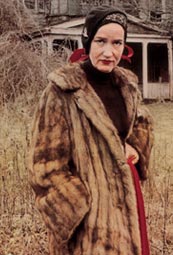 Before reality television saturated the networks, and even before Michael Moore was applauded as innovative for his up close and personal satirical style in documentaries like “Roger and Me,” Albert and David Maysles produced “Grey Gardens,” a controversial documentary that in the mid-70s became a cult hit for its unflinching yet compassionate portrayal of two isolated, eccentric women.
Before reality television saturated the networks, and even before Michael Moore was applauded as innovative for his up close and personal satirical style in documentaries like “Roger and Me,” Albert and David Maysles produced “Grey Gardens,” a controversial documentary that in the mid-70s became a cult hit for its unflinching yet compassionate portrayal of two isolated, eccentric women.
I only recently discovered the film because of the recent Broadway success of the musical version of “Grey Gardens,” which deservedly won two Tony awards last weekend that quickly placed it in my queue at Netflix. The movie is riveting, touching, humorous, and bewildering all at the same time, and it is my DVD pick of the week for those of you who are willing to try watching something a little unconventional.
In the documentary, the Maysles spend part a summer in East Hampton with Big and Little Edie and attempt to chronicle their lives and examine how two high society dames came to live this way. I say “attempt” because they have to overcome various obstacles such as cats and raccoons pouncing on them at any moment, random song and dance numbers interrupting serious interview questions, and occasional amorous advances by Little Edie toward the two filmmakers.
Yet the directors never mock the women with their footage nor do they seem to pass judgment on their lifestyle. Yes, the women are highly eccentric and have an extraordinarily dysfunctional relationship to say the very least. But these women are also are deeply moral and kind women who love the Catholic Church and listen to inspirational speaker Norman Vincent Peale on the radio on a regular basis. They don’t see themselves as victims–well, most of the time anyway–but as women who could never quite fit in to the ever changing postmodern world around them–and don’t necessarily want to.
The movie also doesn’t try to find pat explanations for why the women ended up this way. Is their demise because of circumstances that denied them a fortune that was their birthright? Or are there psychiatric reseasons why a woman like Little Edie, who had so many advantages in life, ended up accompishing nothing of consequence by many people’s standards? We’ll never know for sure.
On a deeper level, “Grey Gardens” reflects the decay of American class society and the ever-increasing divide between the haves and the have-nots in our world. And the images of this film certainly made me think of the many “Edies” in our society who need authentic human contact to pull them back into reality.
And now that I have come to care deeply about the memories of these two unusual ladies, my biggest concern will whether or not the upcoming feature with Drew Barrymore and Jessica Lange will trivialize these women or give them the respect they still deserve.


